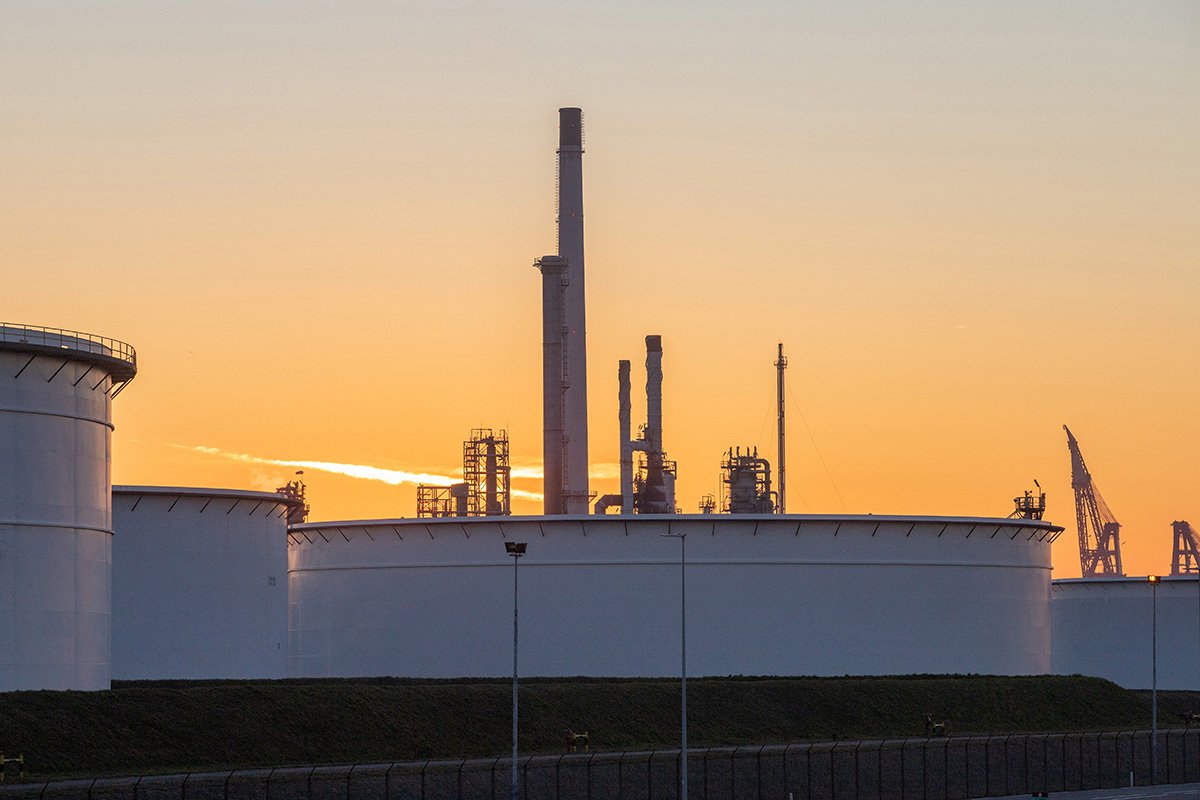The same day that Russian forces dropped cluster bombs on neighbourhoods in Kharkiv, the Tyrrhenian Sea, a giant oil tanker chartered by Gunvor and carrying 100,000 tonnes of fuel oil coolly manoeuvred out of Russia’s Ust-Luga port. Heading West, it sailed out across the Baltic Sea and motored towards Rotterdam where it would discharge its cargo eleven days later.
In the weeks that followed, the death toll in Ukraine would rise into the thousands and millions would be displaced, but the cargoes of oil continued to ship from Russian ports maintaining a lucrative stream of revenue for the Kremlin’s ever more brutal war effort.
Commodity traders—a small group of companies with little public profile that dominate the world’s supply of natural resources including oil—were doing their bit. According to data seen by Global Witness, several commodity traders were busy transporting more oil than normal.
Information on the charterers of tankers from financial data provider Refinitiv now suggests that in the calendar month following Russia’s invasion of Ukraine, three of the world’s largest commodity traders—Vitol, Trafigura and Glencore—transported more oil from Russian ports than they had done in the same period over at least the last three years. Only one commodity trader that we looked at, Gunvor, saw a drop in its monthly volumes compared to March 2021. Refinitiv does not always include the name of the charterer in its data, and therefore Global Witness gives conservative estimates for the volumes of crude and oil products transported.
By the end of March and including some shipments in the last week of February, these four commodity traders had lifted 67 cargos of crude and oil products from Russian ports with a combined volume of 6.1 million tonnes.
The Refinitiv data also shows that Vitol—the world’s biggest independent oil trader—chartered vessels carrying 2 million tonnes of crude and fuel products loaded at Russian ports in March, the largest volume of all the commodity traders we looked at. As well as Russian crude, Urals and Siberian Light, a portion of the oil Vitol transported in March was the majority Kazakh CPC Blend which comes through the Caspian Pipeline and is loaded at the Russian port of Novorossiysk.
Historical data also from Refinitiv suggests that this was Vitol’s busiest March chartering vessels in Russian ports in at least eight years, and its fourth busiest month since January 2015 (as far as the data goes back). So much for solidarity with the Ukrainian people.
Trafigura lifted 1.6 million tonnes of crude and oil products from Russian ports in March, higher than for any single month in almost the last eight years.
Glencore had its best March in three years, with volumes approaching pre-pandemic levels. Figures for Glencore include volumes lifted from Russian ports by ST Shipping, a wholly owned subsidiary of Glencore.
Gunvor—which trades more than 2.6 million barrels of crude and oil products a day according to its website—chartered ships carrying 300,000 tonnes of crude and fuel products out of Russia in March, the bulk of which originated from the Baltic port of Ust-Luga.

Gunvor's refinery at the Port of Rotterdam. Peter Boer/Bloomberg via Getty Images
Global Witness approached all four companies for comment prior to the publication of this article.
Vitol disputed our findings telling us that, according to their own records, volumes lifted from Russian ports in March 2022 were in fact the fortieth highest since January 2015. It was not willing to confirm or deny the volume of crude and oil products they shipped in March, nor were they willing to share any monthly data on volumes that would allow Global Witness to check their statements. The company said it was not able to verify whether or not they lifted the most crude and oil products from Russian ports of all four commodity traders we looked at. However, a spokesperson said, “What we do know is that Vitol is not the largest lifter of Russian origin crude and products”.
Trafigura told us they were continuing only to fulfil long-term contracts with Rosneft and were not doing any new business in Russia. A spokesperson for the trading house said that Trafigura is purchasing lower volumes of Russian oil and oil products following the invasion and that Trafigura has not increased its business with Russian oil and gas companies since the war in Ukraine began. They also said that chartering data from Refinitiv was not an indication of the volumes of oil a company traded, but rather what they transported.
A spokesperson for Glencore pointed us to their public statement from March 30 which says that the company continues to condemn the actions taken by the Russian government against the people of Ukraine and it will continue to honour pre-existing contracts, subject to meeting all applicable sanctions, but will not enter into any new trading business for Russian origin commodities “unless directed by the relevant government authorities”.
Gunvor responded that Global Witness’ data was incomplete and conclusions incorrect. They did not however clarify what the correct volumes were, nor whether the tanker mentioned at the start of this article, the Tyrrhenian Sea, was in fact chartered by Gunvor. The spokesperson said that Gunvor is legally obliged to fulfil existing trading contracts that are not sanctioned and that no new business is being conducted.
There is no suggestion that what these companies are doing is illegal or violates sanctions. However, the uptick in the volumes of oil loaded at Russian ports for Glencore, Vitol and Trafigura immediately after the invasion demonstrates yet again the callousness of a fossil fuel industry prepared to make money regardless of the cost to people and planet.
Commodity traders, a track record of profiting from precarity
Commodity traders are not known for their moral scruples.
They have a high appetite for risk and a track record of ruthlessly trying to secure deals for natural resources in places vulnerable to corruption and prone to conflict. They go where other companies fear to tread. A significant chunk of their revenue derives from trading fossil fuels which are pushing us ever closer to ecological catastrophe.
We don’t buy fuel at the pump or our electricity from them, but they are critical players in the fossil fuel industry, taking part in all aspects of the trade including production, transportation and refining.
Unlike the vertically integrated oil majors, commodity traders are not household names and therefore have little public reputation to protect. Only one of the four commodity traders we looked at, Glencore, is publicly listed meaning that despite being wildly profitable they operate with lighter regulation than some of their oil trading peers.
They are no strangers to controversy.
Vitol was embroiled in a scandal surrounding the UN oil-for-food program and admitted to paying $13 million in bribes to Iraqi officials under Saddam Hussein to win oil supply contracts. More recently, Vitol agreed to pay $164 million in settlement with US and Brazilian authorities, having admitted that it paid bribes in Brazil and other Latin American countries to boost its oil business.
In 2021, one of Glencore’s former traders pled guilty to money laundering and violation of the US Foreign Corrupt Practices Act. While working for Glencore he had bribed Nigerian government officials to secure lucrative oil contracts.
But even by the dubious standards of this group of traders, this is a new low. The Russian fossil fuels they profit from are not only destroying the planet but are a clear and immediate source of funding for Putin’s brutal assault on Ukraine.
Pre-invasion, fossil fuels made up about 45% of Russian federal government revenue, and Trafigura, Vitol and Glencore all have stakes in Russian state-owned oil companies or operations.
All four commodity traders continued to back Russian fossil fuel projects and companies following the annexation of Crimea, a period during in which Putin sought to build his war chest, and use revenues from oil and gas projects to limit the damage of future sanctions. The trading houses still retain these assets, although in their response to our request for comment all four companies said they were reviewing them.
In December 2020, Trafigura acquired a 10% stake in Vostok Oil, Rosneft’s Arctic oil project. A spokesperson for Trafigura said they had not received any dividends from it. Vitol also acquired a stake in Vostok Oil in 2021, the company said the stake was “illiquid”. Glencore owns a share of Rosneft having bought it in 2016. While Gunvor sold 74% of its stake in the Ust-Luga Oil Products Terminal in 2015, it retains a minority stake to this day.
Javier Blas, Chief Energy Correspondent at Bloomberg News and co-author of The World for Sale, a deep-dive into the colourful history of the trading houses, wrote last month in The Spectator that certain commodity traders had "probably done more to help Putin remain in power than anyone else in the international business community since the West imposed sanctions on Russia in 2014 over the annexation of Crimea”.
The need for an embargo of Russian fossil fuels, and a total phase out in future
According to data from Refinitiv, total volumes of oil transported from Russian ports have been picking up pace since many of the world’s major economies have come out of lockdown.
Disturbingly, volumes lifted from Russian ports in March were up 3% on the previous month suggesting that self-sanctioning by companies is yet to influence shipments. Total production of Russian crude was reportedly down in March suggesting that a dip in shipments may be in the pipeline.
What is clear is that continued streams of exports from Russian ports and high oil prices are keeping Putin’s war machine running. The Centre for Research on Energy and Clean Air estimates that since the start of the conflict the EU alone has paid over 27 billion euros for fossil fuels to Russian companies.
To make a real dent in Putin’s war chest, we need an immediate and total embargo on the import of Russian fossil fuels.
All four trading houses point to existing long-term contracts as the reason they continue to lift oil from Russian ports.
Yet it’s not clear why they can’t get out of these contracts, given the extreme circumstances. There may be financial penalties, but monetary costs pale in comparison to the reality of the bloodshed in Ukraine.
Oleg Ustenko, economic advisor to Ukrainian president Volodymyr Zelenskyy, wrote to all four commodity traders at the end of March asking them to disclose information on the number of long-term contracts still in play and their value. None of the commodity traders were able to clarify.
We asked Glencore, Vitol and Trafigura if they were able to disclose whether there was any flexibility in the volumes of oil they were mandated to pick up from Russian ports under long-term contracts. A spokesperson for Trafigura said they were continuing to fulfil their legal obligation under a long-term contract with Rosneft and that “volumes purchased are consistent with monthly averages stipulated by these contracts”. The other traders did not come back to us on this point.
The fact that commodity traders still haven’t made firm commitments to exit Russian fossil fuels completely in the short term, and in some cases have upped their efforts to transport Russian oil, underscores that the fossil fuel industry cannot be trusted to do the right thing when it comes to protecting people and planet. Governments need to step in.


